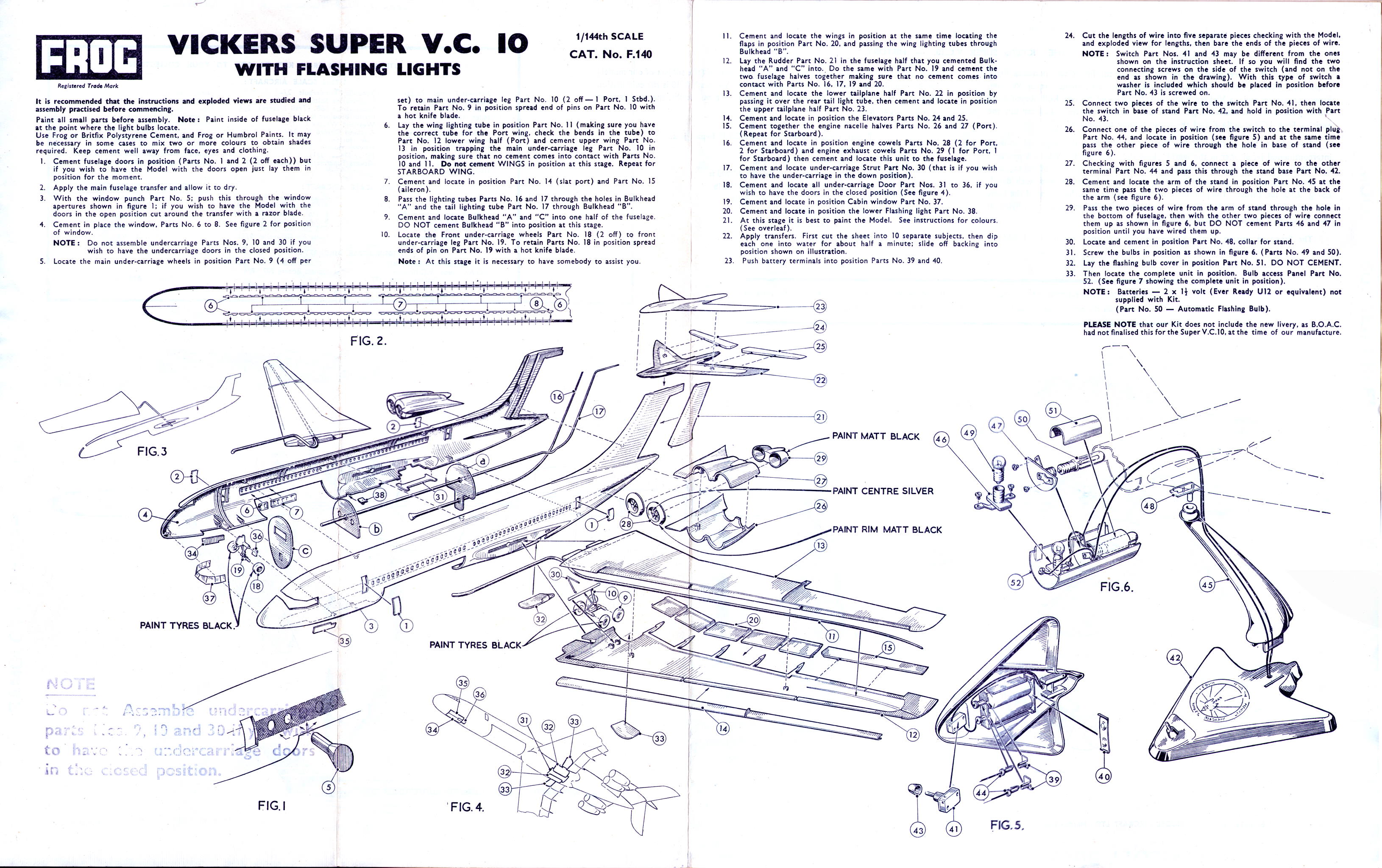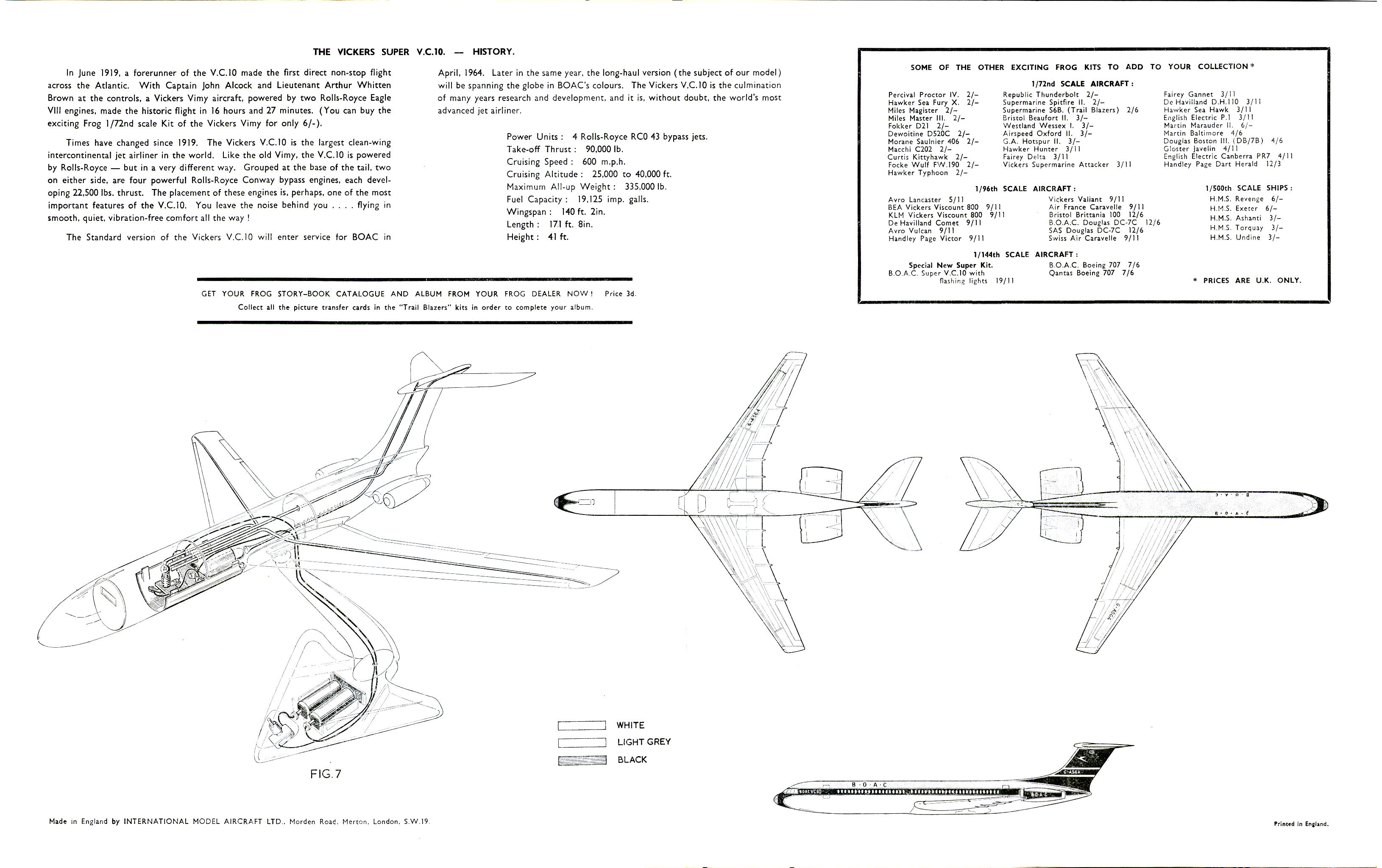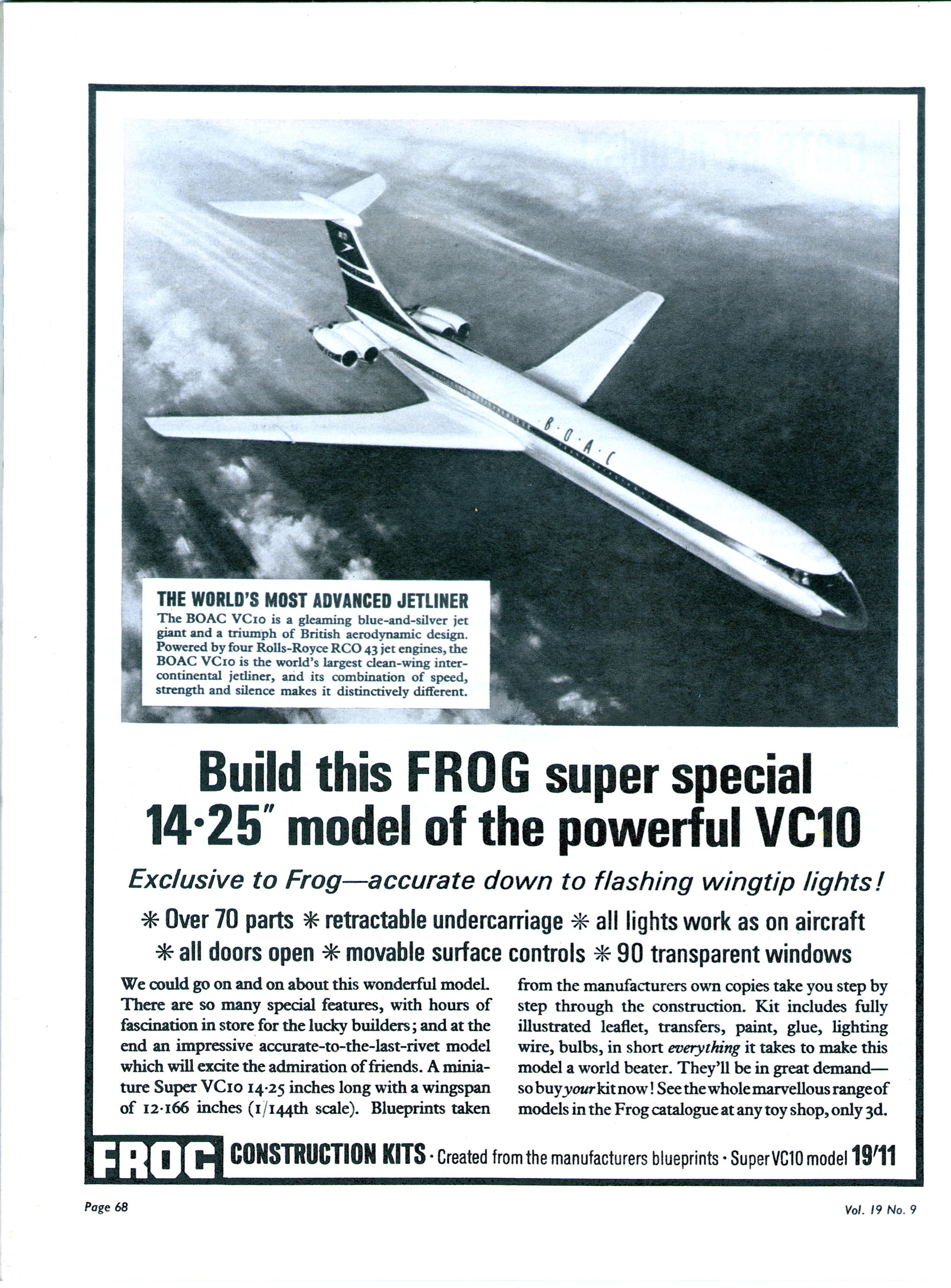





|
"Model Talks
Go civil for a change
VC10 FANCY FROM FROG AND PLAIN FROM AIRFIX
Frog have recently issued a l/144th scale kit of the Vickers Super VC10, complete with flashing navigation lights powered by a battery within the stand for the model. Considering firstly the model as a model, this provides an example of too much effort being put into the "works", to the detriment of the finished result. On this small scale, it is exceedingly difficult to make moving parts operate efficiently and, at the same time, preserve accuracy of appearance. Frog have attempted to provide operating flaps, but the Super VC10's very complex mechanism has defeated them, and the flaps neither look right nor operate effectively. It is perhaps better to correct the appearance of the flaps and cement them permanently in place. The fit of some component parts is not above criticism, and on the example submitted for review, there was a good deal of flash and shrinkage. Frog assure us, however, that this was a case of poor moulding, and it is to be admitted that a second example of the kit did not suffer from these faults. From all other aspects, Frog's Super VC10 is a good model, but rather highly priced (nineteen shillings and elevenpence in the United Kingdom).
Issued at the same time as Frog's Super VC10 came Airfix's Standard version of this largest of European airliners. We do not know if it was chance or design that led the two kit manufacturers to select different versions of the one aircraft type—we suspect the former—but coincidence or not, it is fortunate for the airliner addict that very good kits of both the VC10 and Super VC10 should appear at the same time.
The Airfix VC10 is a very good model indeed; simple, straightforward, accurate in outline, and cleanly pressed. The component parts fit together very well and, apart from an ingenious and effective moving tailplane, the kit has no working parts and in our opinion, gains thereby. Perhaps its only fault is that, unlike the Frog Super VC10 which is pressed in the correct shade the plastic is too dark a shade of grey—almost a camouflage tone! A good BOAC transfer sheet is provided, although, due to an error, the wing registration letters have been printed in white instead of blue. Airfix are correcting this as quickly as possible and at six shillings in the United Kingdom, this VC10 kit is good value for money and well worth buying."
W.R.Mathews
Flying Review International 1964 august Vol.19 No.12
Over the counter
reviews new Trade products
New Plastics
Airfix this month are offering a model of the VC 10 in their standard 1/144 scale and costing 6s. The kit assembles easily and well and there are no obvious errors. With this aircraft currently so widely in the news the kit should prove very popular.
From Frog we have received a 1/144 Super VC 10 kit with a new gimmick—interior lighting and flashing navigation lights. This kit costs 19s. 6d. and is not for the beginner, as even the instruction sheet, at one stage, recommends another pair of hands. An attempt at moveable control surfaces leaves unacceptable gaps and, in the case of the flaps, are most unrealistic. The wing tips are the wrong shape, being that of the standard machine, but this can be rectified with a file. The lights do work for those that want to play with their model, but assuming these, which add one inch on the fuselage length, are the cause of the rather high cost of this kit, the builder must decide if they are worthwhile.
Model Aircraft September 1964
"THE В.А.С. AIRLINERS
Generally acknowledged to be the world's most comfortable jet airliner, the Vickers VC-10 has suffered by comparison with similar types on account of late introduction and political interference. For these reasons, it has not entered service in large numbers, compared with American jet airliners, but nevertheless over 50 of this largest of all European aircraft have been sold. and no collection of models in which airliners are represented at all should be without it.
The VC-10 exists in two versions, Standard and Super, and our artist has illustrated both. The main difference between the two is in the fuselage length; a difference which used to exist does so no longer, since all Super VC-10's have been fitted with the extended wing tips of the Standard version. The R.A.F. version, though outwardly a Standard, is in fact a hybrid between the two types; it is fitted, like B.U.A.'s aircraft, with a freight door approximately 10' wide x 7'6" high in the port side of the forward fuselage (0.83" x 0.62" in 1/144th scale). Windows nos. 5-10 inclusive are fitted in this door.
Kits of the VC-10 are offered by both Frog and Airfix in l/l44th scale. The former model represents the Super version, the latter the Standard. Both are good models, and little alteration is needed to either; the wing tips of the Frog kit (which represents the aircraft as it originally appeared) have to be extended to the same shape as that of Airfix's model, and most modellers will probably prefer to cement the flaps closed, as the latter do not work properly. Whether the electric fittings are retained is a matter of choice - these in fact work very well and enhance the model's appearance. The Airfix kit represents B.O.A.C.'s aircraft exactly, but all other Standard VC-10's have the wing leading edge extended. This extension runs along a line between the existing leading edge at the inner wing fence and a point 0.05" forward of it at the outer fence; outboard of this latter the leading edge follows the original line. B.U.A, and Ghana Airways VC-10's have the wing tips further modified, these projecting forward of the leading edge by 0.05" (l/l44th scale) at the outermost edge of the leading edge slats; they are also thicker at this point than the wing itself, and join back into the main contour of the wing lower surface in a concave curve; the inner side of this thickening is vertical. All VC-10's are painted overall, and the colour of the Frog kit's plastic is exact. The Airfix model is much too dark a grey, and has to ba painted to match the Frog one; Humbrol Railway Enamel B.R. Freight Stock Grey, with the addition of about 20% of gloss yellow and 10% of gloss white will give the correct shade.
As regards colour schemes, the drawings are self-explanatory; without doubt the most attractive of all VC-10's are the Supers for East African Airways; the description of these appearing here is the first ever to be published. A point to note with regard to these aircraft is that one of the three is registered in each of three East African countries; the registrations are: 5Y-ADA (Kenya), 5H-MMT (Tanzania) and 5X-UVA (Uganda). In each case the flag of the country owning the aircraft appears at the top inside the star on the tail, the three flags being rotated clockwise from the positions shown in our drawing.
All civil VC-10's have registration letters below the Port wing, the set being about 3/4" long in l/l44th scale. Most have a similar set at present above the Starboard wing, but these will probably disappear as new regulations regarding the marking of airliners come into force. They have already been omitted from the Е.А.A. machines. R.A.F. machines carry roundels 3/4" in diameter (l/l44th scale) immediately forward of the inboard ends of the ailerons above and below the wings. Serial numbers, the set being 1 1/4" long, are painted inboard of these parallel to the leading edges in standard R.A.F. style."
The IPMS magazine september 1966
| F140 | 1964-1972 | X | 80000 | BOAC |
| F135 | (1968-1970) | - | - | East African & BOAC |
The VC10 was quite an innovative kit. Inside the fuselage
were two small bulbs (one of them flashing) which were
powered by batteries in the stand. The light was led
through clear plastic runners to the fin and wing tips, as
well as fuselage beacons. F135 was a planned version
without lights - similar to the later Novo issue - which was
cancelled. A small number of proof decal sheets were
printed, however. BOAC changed their livery in 1965, and
this was soon followed by a new decal sheet in the kit as well.
The IPMS magazine september 1966
|
|




